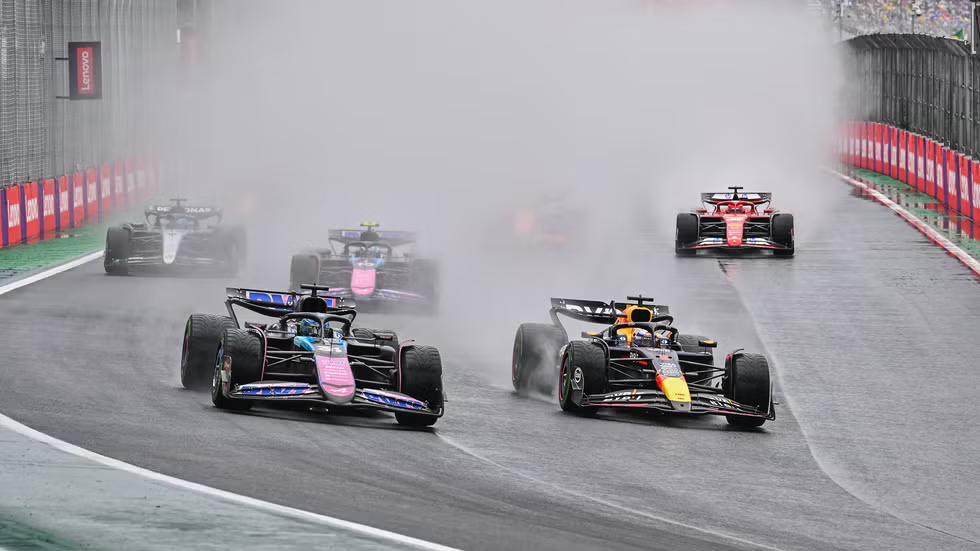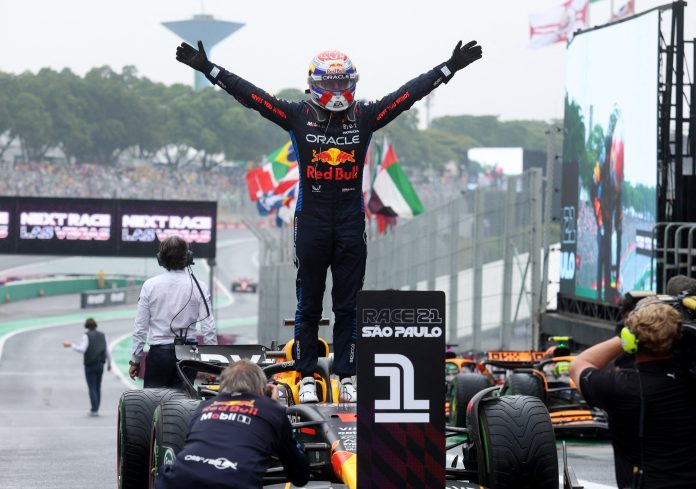In an unforgettable Sao Paulo Grand Prix, Max Verstappen delivered a performance for the ages, clinching a remarkable victory from 17th on the grid under challenging wet conditions. His masterful drive has extended his lead over Lando Norris in the Formula 1 title race to 62 points, leaving just 86 points available in the season’s final three races. This achievement was not only Verstappen’s 62nd career victory but one that many consider among the greatest wet-weather performances in F1 history.
With Norris finishing sixth, his slim title hopes were effectively extinguished, highlighting Verstappen’s dominance in this season’s battle for the championship.
Verstappen’s Historic Drive from 17th to First
Starting 17th due to a grid penalty and a tough qualifying session, Verstappen’s path to victory was anything but straightforward. The Red Bull driver navigated a chaotic race filled with rain, safety cars, and red flags, ultimately showcasing his unparalleled skill in wet conditions. In the early stages of the race, Verstappen gained six positions on the first lap alone, signaling his intent.
By the 12th lap, he was within striking distance of the leading pack, with only a few seconds separating him from George Russell and Norris, who were battling for the front. His relentless pace allowed him to catch up quickly, especially as the rain intensified. Verstappen’s ability to maximize grip and execute flawless overtakes set him apart, even as other drivers struggled.

His aggressive driving paid off during a crucial five-lap window when rain worsened. As Russell and Norris pitted for new tires, Verstappen and Esteban Ocon from Alpine opted to stay out, risking their positions on worn tires. This gamble proved successful when a red flag was issued, allowing them to switch to fresh tires without losing any track position.
Reflecting on a Remarkable Win: Verstappen’s Take
For Verstappen, the Sao Paulo Grand Prix was a defining moment. Speaking after the race, he described his emotions as a “rollercoaster” following a frustrating qualifying session where he was unable to secure a favorable starting position. He admitted that his initial expectations were low, saying he “expected to lose points” to Norris and Russell. However, the Dutch driver’s motivation to make up for his starting disadvantage drove him to an exceptional performance.
Verstappen acknowledged that the win was “incredibly important” as he closes in on his fourth world title, though he downplayed the significance of clinching the championship in the upcoming race in Las Vegas. His focus, he said, was on “clean races” to finish the season strong, underscoring his determination to maintain his high standards without getting distracted by championship calculations.
Lando Norris and McLaren’s Pit Stop Dilemma
While Verstappen’s strategy paid off, Norris and McLaren found themselves on the losing side of a strategic gamble. The timing of their pit stop, taken just before the red flag, proved costly. Norris admitted the call was “unlucky,” expressing frustration with the rule that allows drivers to change tires under a red flag, benefiting those who hadn’t pitted.
McLaren team principal Andrea Stella defended the decision, explaining that Norris and teammate Oscar Piastri had requested fresh tires due to the deteriorating conditions. As Stella pointed out, the team’s priority remains the constructors’ championship, where McLaren is currently in a strong position, and the pit stop choice was made with that in mind. Despite the setback, Norris acknowledged Verstappen’s superiority, conceding that the Red Bull driver would “probably have come through anyway and beaten us.
The Rivalry with George Russell
Norris wasn’t alone in his frustration. George Russell, who had a strong start and briefly led the race, also felt that he could have achieved a better result if not for the pit stop call. Russell explained that he initially resisted Mercedes’ call to pit, sensing that the worsening weather might lead to a red flag. However, he ultimately complied with the order, leaving him to reflect on what might have been had he stayed out longer.
Russell’s performance nonetheless underscored his competitiveness, and his disappointment echoed Norris’s sentiment about the race’s unpredictable nature. Both drivers acknowledged that Verstappen’s sheer pace and mastery in wet conditions made him the clear standout, regardless of the race’s twists and turns.
Alpine’s Historic Double Podium Finish
The Sao Paulo Grand Prix also brought a surprise success story for Alpine, with Esteban Ocon and Pierre Gasly finishing in second and third, respectively. This marked the team’s first double podium finish, an impressive feat given Alpine’s challenging season and relative lack of competitiveness. The team’s strategy to stay out during the virtual safety car worked in their favor, and both drivers made the most of their positions when the red flag enabled a free tire change.
Ocon and Gasly, who have had a complex relationship over the years, found a shared moment of pride in their unexpected success. Both drivers reminisced about their early days racing together in go-karts, where they often competed under similarly difficult conditions. This historic finish highlighted Alpine’s resilience and their ability to capitalize on challenging race conditions, ending their season on a high note.
What Lies Ahead in the F1 Championship
With only three races remaining and Verstappen leading Norris by 62 points, the championship picture is becoming increasingly clear. Verstappen needs only a 60-point advantage by the end of the Las Vegas Grand Prix to officially secure his fourth title. While Norris and Ferrari may pose a challenge in the remaining races, especially in conditions that might favor McLaren’s setup, the title seems all but assured for Verstappen.
Even if Verstappen fails to clinch the title in Las Vegas, the upcoming race in Qatar offers another chance to close the season in triumphant style. For McLaren and Mercedes, the remaining races present an opportunity to solidify their standings in the constructors’ championship, with McLaren focusing on maintaining their edge over competitors.
The Legacy of Verstappen’s Sao Paulo Drive
Verstappen’s drive from 17th to first in the Sao Paulo Grand Prix will undoubtedly be remembered as one of the finest wet-weather performances in Formula 1 history. His ability to remain calm, execute strategic overtakes, and maintain control under difficult conditions showcased his mastery of the sport. Red Bull team principal Christian Horner praised it as “one of the great drives in F1,” and fans and analysts alike have echoed that sentiment.
The Sao Paulo victory underscores Verstappen’s dominance in the current F1 era and solidifies his position as one of the sport’s all-time greats. His relentless pursuit of victory, regardless of starting position or weather conditions, speaks to his exceptional skill and determination.
RELATED ARTICLES:


